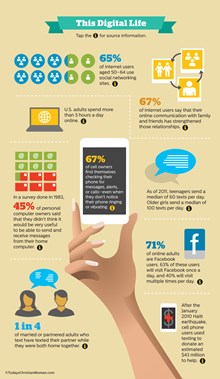Real Connection in a Digital World
When I first met Lucy Maud Montgomery's beloved heroine in Anne of Green Gables, I knew I had found my kindred spirit. I related to Anne Shirley's fiery temper, uncanny ability for "getting into scrapes," fast-flying tongue, and roller-coaster emotions that quickly move from the heights of rapture to the depths of despair. But most of all, I identified with Anne's desire for a close female friend. In Anne of Green Gables, she asks her mom, Marilla,
"Do you think that I shall ever have a bosom friend in Avonlea?"
"A—a what kind of friend?"
"A bosom friend—an intimate friend, you know—a really kindred spirit to whom I can confide my inmost soul. I've dreamed of meeting her all my life. I never really supposed I would, but so many of my loveliest dreams have come true all at once that perhaps this one will too. Do you think it's possible?"
Here in the real world, many of us wonder if our own longing to connect will ever be satisfied. With all of the technological advances we've made in the century since Montgomery penned her classic tales, you would think we would have figured out a way to meet the human yearning for deep friendships. We spend our days connecting with one another on the World Wide Web. We touch base with more people through social networking websites like Facebook than Montgomery probably encountered in her lifetime. Yet many of us are still asking ourselves, Why do I have so many acquaintances and so few close friends?
One is the loneliest number
If you are lonely, you are not alone. According to one recent study, Americans today are far more socially isolated than Americans were just two decades ago. One-fourth of respondents said they didn't have one single person to confide in. That is surprising, considering that over the past two decades, most people in the developed world have gained personal computers, the Internet, and cell phones. So how can people who are more connected across time and space feel more isolated than ever?
John Cacioppo, psychologist and co-author of the book Loneliness: Human Nature and the Need for Social Connection, offers one explanation. He writes, "The abstracted nature of electronic communication—the absence of physical context and forms of connection—may account in part for the finding that increased Internet use can increase social isolation as well as depression when it replaces more tangible forms of human contact." So while online technology makes our communication more efficient, it often replaces face-to-face communication and thus increases our sense of social isolation.
Cacioppo reports that the human mind is hard-wired for relationships: "When we humans see other humans, or even pictures of humans, our brains respond in a way that is different from when we see most other types of objects." Of course, the idea that we are meant for human connection is not new. More than 2,000 years ago, Jesus was asked, "'Teacher, which is the greatest commandment in the law of Moses?' Jesus replied, 'You must love the Lord your God with all your heart, all your soul, and all your mind.' This is the first and greatest commandment. A second is equally important: 'Love your neighbor as yourself.' The entire law and all the demands of the prophets are based on these two commandments'" (Matthew 22:36–40). God's greatest commandments are to love him and to love others. So it's no wonder that we desire connection; it was God who wired us for relationship.
Unfortunately, we often seek that connection through sinful and unsatisfying means. Satan loves to trick us into trying to meet real, God-given needs in distorted ways. Instead of reaching out to flesh-and-blood neighbors, we spend time with our favorite characters on TV, hoping they will keep us company. We rack up hundreds of "friends" on websites like Facebook and Twitter, but often we seek to prove our worth and popularity instead of really connecting. We sit silently side by side in coffee shops with our laptops open, hoping to find a sense of community. Yet we still feel alone because we are trying to meet the need for friendship with faulty solutions.
The Great (Online) Commission?
So should we throw our computers out the window and return to writing letters and sending telegrams? When Jesus prayed to the Father about us, he said, "I'm not asking you to take them out of the world, but to keep them safe from the evil one" (John 17:15). That means we are called to be in the world but not of the world. Forming a low-tech Christian commune will not likely bring many people to Christ. If the world is online, then Jesus' followers need to be there too. But, as Jesus prayed, we do need protection from the evil one who would love to trip us up along the way.
In 2010, Facebook creator Mark Zuckerberg was named Time magazine's person of the year. At that time, Facebook's membership was growing at a rate of about 700,000 people a day and that 1 of every 12 people on the planet has a Facebook account. And here's a staggering thought: If Facebook were a country, it would have the third largest population, behind China and India.
Before Jesus ascended into heaven, he told the disciples to "go and make disciples of all nations, baptizing them in the name of the Father and the Son and the Holy Spirit. Teach these new disciples to obey all the commands I have given you. And be sure of this: I am with you always, even to the end of the age" (Matthew 28:18–20). If we go by the numbers, then Facebook has become a veritable nation! Christians need to go to Facebook and make disciples there.
Ask the tough questions
But as we seek to evangelize on the Web, we must be careful not to overuse electronic forms of communication. Unless we are intentional about it, we could easily waste our lives gazing at screens and gadgets instead of looking into the eyes of friends, family, and others whom God has placed in our paths. What concerns me is not the presence of electronic media in Christians' lives, but the relative lack of spiritual, intellectual, and relational pursuits in comparison. Electronic access can quickly turn to electronic excess. And excess robs us of time that could be spent investing in things that provide greater satisfaction and build better friendships.
The apostle Paul cautioned the church in Corinth concerning freedom: "You say, 'I am allowed to do anything'—but not everything is good for you. You say, 'I am allowed to do anything'—but not everything is beneficial" (1 Corinthians 10:23). Paul's words prompt us to consider some tough questions. How many hours do we spend reading, praying, studying our Bibles, and reaching out to others? And how does that compare with the time spent looking at screens? Are we regularly inviting people into our homes? Are we tangibly investing in the lives of our neighbors? Are we demonstrating through our own relational choices the kind of face-to-face, personal relationship that God wants to have with each of his children? If God cares deeply about knowing people personally, we should too.
Drowning in shallow waters
Facebook can be a lot of fun. I love laughing at status updates and seeing photos of friends and their families, especially since many of them live over a thousand miles away.. Facebook can be a great tool for connecting people with similar interests, publicizing ministries, and inviting others to real-world events. I have used it to reconnect with childhood friends, members of my extended family, and long-lost sorority sisters. It provides a simple way to send a reminder to our moms' group, post an encouraging Scripture passage, or get a daily dose of laughter. But it is not typically a place where people get real with each other or issue cries for help.
It seems to me that as our communication moves more to text messaging, Facebook, and e-mail, our friendships grow in quantity but also shrink in quality. We each yearn for friendships that go below the surface. And kindred-spirit friendships like the kind Anne of Green Gables found with her neighbor, Diana Barry, don't happen through Facebook updates or witty tweets of 140 characters or less. My closest friend wouldn't be my closest friend if we had not weathered the storms of life together. When waves of depression threatened to overtake me, my friend was there treading water beside me. As she struggled through the grief of losing her infant son, I swam silently alongside. When our marriages and children have brought disappointment, we have waded through it together. The deep and murky waters of our friendship hold vulnerability, sorrows, and frustrations that we would never post online for the world to see.
But, in contrast to deep and meaningful real-life friendship, many of us are drowning in shallow waters. We are struggling in acquaintanceships that will never deepen into fulfilling friendships . . . until we take an authentic journey into the storm together.
Ultimately, all earthly friendships are shadows of the relationship we will have in heaven with the friend who sticks closer than a brother (Proverbs 18:24). When we get to heaven, we will know God fully as we are fully known by God. Revelation 22:4 tells us, "And they will see his face." That will be our ultimate reward—to see God face-to-face. Until then, we have the opportunity to reflect the love of Christ through face-to-face friendships on Earth. As we enjoy deeper friendships with others, we will point to a heavenly Father who also wants a personal and eternal relationship with them.
Subscribe to TCW at this link, and sign up for our free e-newsletter to become part of a community of women striving to love God and live fearlessly in the grit of everyday life.
Jenni Roney is a writer and speaker, blogger, Bible study leader, and co-leader of the MOMS group at Bethlehem Baptist Church. She lives in Northfield, Minnesota, with her husband and three boys. Jenni learned about friendship when her family moved nine times in eleven years.
Read more articles that highlight writing by Christian women at ChristianityToday.com/Women
 Read These Next
Read These Next


 It Takes a Community to Sustain a MarriageCommunity doesn’t have to be formal, but it should be intentional.
It Takes a Community to Sustain a MarriageCommunity doesn’t have to be formal, but it should be intentional.
 10 Non-Obnoxious Ways to Share Your Faith at WorkUse these ideas to help you integrate faith and work.
10 Non-Obnoxious Ways to Share Your Faith at WorkUse these ideas to help you integrate faith and work.








 Homepage
Homepage